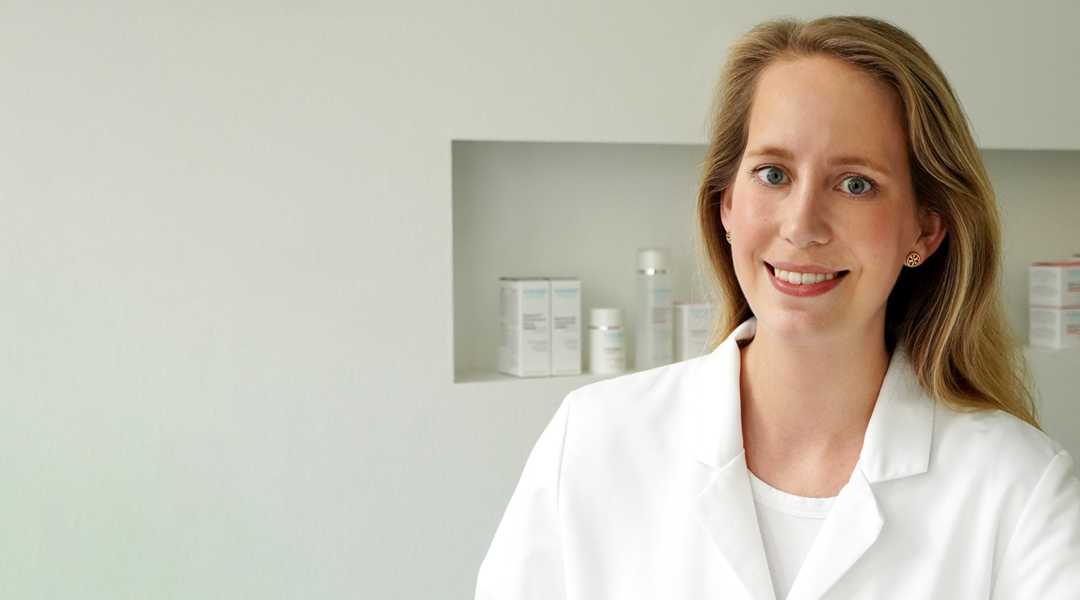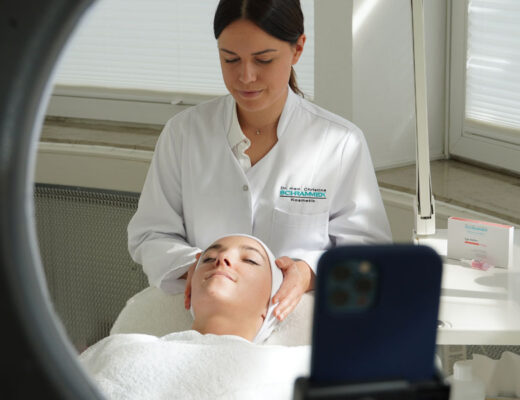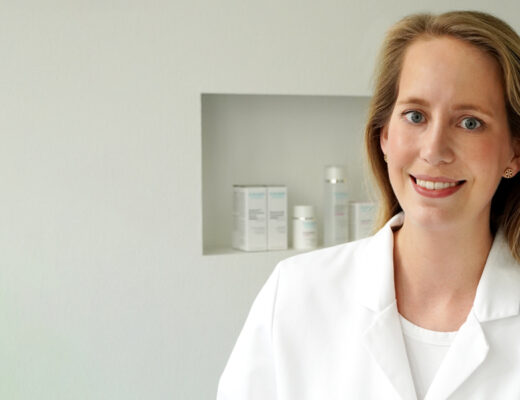Today: Beauty tips from the doc!
As a specialist in dermatology and venereology, Christina Drusio brings the latest impulses to the development of medically inspired care products. This time, the interview series is about the topic of care routines. Look forward to personal insights and expert tips about skin care.
Hello Ms Drusio, why is skin care so important?
Christina Drusio: The skin is our largest organ and does a lot! In addition to its function as a communication and sensory organ, our skin performs other important tasks, for example in metabolism or in heat regulation. It protects us against external environmental influences, UV and infrared radiation and pathogens. If the skin barrieris not intact, for example, it is easier for inflammations (eczema) or infections to occur. In view of the manifold tasks of the skin, the question of how we can “keep it healthy” as much as possible is not at all absurd! Even, well-groomed skin is not only aesthetically pleasing but also a sign of health and well-being. Which in turn has apositive effect on our self-confidence! That’s why it’s so important to treat your skin responsibly and to care for and strengthen it especially well.
Depending on the skin type and skin condition (these are two pairs of shoes!), active cosmetics can be used either to improve an existing skin problem or to maintain the good condition of the skin if possible. Skin care does not start with a cream, but with our lifestyle habits. If we sleep enough (at least 8 hours a night), drink enough water (2 litres a day), eat a balanced diet, avoid cigarettes and the odd glass of alcohol, enjoy the sun in moderationor with sunscreen, and then engage in regular physical activity, our skin will thank us for it!
What does an optimal care routine look like?
Christina Drusio: For me, optimal means that the care routine is individually adapted to the needs and expectations of the person. The “right” care should always begin with cleansing that is appropriate for the skin type. My mother taught me this early on; never go to bed at night without removing your make-up! A cleansing lotion or milk is usually gentler or more moisturising than cleansing gels or foams. Eye make-up should alwaysbe removed as well, otherwise irritation of the eyes or inflammation of the eyelid margins can occur!
Afterwards, the skin should be toned with a facial toner. In addition to the refreshing effect, it helps to remove any remaining dirt or lime deposits from the water and restores the skin’s own pH value. Then comes the eyecare. Why? For one thing, to support the thin skin around the eyes, which is heavily stressed by the constant blinking of the eyes. On the other hand, eye creams are specially designed for this anatomical region. Unlike some day care products, they do not contain any penetrating oils that could irritate the mucous membranes around the eyes.
The routine usually continues with the application of a lighter (more water-based) serum – or even an ampoule. These products can be used wonderfully to cover acuteskin needs, e.g., an extra moisture boost after a beach holiday. Finally, a day care product tailored to the skin’s needs comes into play. Either with a sun protection factor – or the sun protection can be applied as needed with so-called on-top products over the day care or is already in the make-up. A night cream would then follow in the same place in the care routine – only without sun protection.
Thats sounds like a lot of effort at first. Which three care products are absolute must-haves in your opinion?
Christina Drusio (laughs): Understandably, it sounds overwhelming at first. This is what a complete care routine would look like, but it’s no use if I have 5 products in the bathroom at home and never use them. The care routine must also be adapted to the needs of the user!
Do I enjoy beauty? Do I treat myself to some “me-time”and do I like to pamper my skin? Am I more pragmatically inclined and prefer to choose a product that has multiple benefits? No matter which conclusion you come to, one thing is very important: “Consistency is key” – as with somany things in life! If I exercise only once a month, my body will not change much. If, analogously, I only apply my face cream once a month, my skin won’t really be cared for either. To come back to your question: If I had to limit myself to 3 care products for the rest of my life, it would be a cleanser, a day care with SPF and (hesitates) … an eye care or a tonic!
How do I know which care is right for me?
Christina Drusio: That is also a very good question, because as much as we can support our skin with the right care, we can also harm it with unsuitable products! Skin care should always be adapted to the skin type. The skin type, for example, combination skin, is genetically predetermined and cannot be changed, neither through products nor through age or lifestyle. The skin condition must be distinguished from this; it always represents a snapshot, e.g., low-moisture skin because it is winter, there is a lot of heating, or you have been in the sun for along time. It can change depending on external environmental influences, age, or life circumstances (hormones). It can help to take a closer look at your skin. If you are unsure, you should go to a cosmetic institute for an expert skin analysis to learn more about your own skin!
Can you tell us your personal anti-aging secret tip?
Christina Drusio: Sun protection! Sun protection! Sun protection! Even if you think that you don’t really need sun protection because the sun is not shining, or we are in the cold season. UV-radiation has a very big influenceon skin aging. If you use sunscreen every day (at least SPF 20, ideally SPF 50 in summer), you will protect your skin from UV-related damage and skin aging. Another “insider tip” is the ingredient Bakuchiol. This natural active ingredient is found in the seeds of the Indian Babchi Plant (“Psoralea Corylifolia”) and is recommended by the Society for Dermopharmacy, among others, as an “anti-aging active ingredient”. Bakuchiol has a strong antioxidant, regenerative and anti-inflammatory effect, at the same time helping to maintain the skin’s elasticity and stimulate collagen formation. It is a gentler but still well effective alternative to retinol. I wouldn’t want to miss my day care with Bakuchiol!
Men now also feel the need to care for their skin properly. Nevertheless, for most it should be fast and convenient. Do you have any tips for our male readers on what to look out for?
Christina Drusio: An attractive appearance naturally includes skin – most men are now aware of this. And also that they need their own skin care products. The main question is which ones? First of all, it is important to know that men’s skin is hormonally and anatomically more robust and thicker (by up to 15-20%) than women’s skin. This means that it is better protected from external influences such as UV radiation, environmental stressand temperature fluctuations. Sebum production, which is also mainly controlled by the male sex hormone testosterone, is much more pronounced than in women’s skin and thus the outer lipid film is also more stable. This leads to a favourable water-binding capacity, which also makes men’s skin appear plumper and firmer. For this reason, it requires different care than female skin. Cleansing is the basis of all good skin care. Even though men often use their partner’s products, products for women are usually too rich for men’s skin, which tends to contain sebum.
Due to the increased activity of the sebaceous glands, men tend to have oily skin. Products that are too rich are therefore not suitable. They would remain on the skin and cause unsightly skin shine or even “pimples”. Products that contain more moisture than oil components are better suited. The textures should be pleasantly light, e.g. hydrogels, serums or fluids. Effective and highly dosed active ingredients such as hyaluronic acid, vitamin C, niacinamide and vitalising plant extracts (e.g. ginkgo or birch) are very suitable for men’s skin.
Another important aspect that must of course also be taken into account is that men’s skin is often irritated by shaving. Therefore, products that relieve the skin after shaving and promote the regeneration process are of great interest. Especially when shaving, razor burn can occur due to an accidental deep abrasion of the corneocytes. Immediate relief is then required. At best, however, this phenomenon should be prevented. Soothing, but also anti-bacterial, anti-inflammatory gels with panthenol, bisabolol or microsilver reduce irritation and rednessand prevent unwanted “rolling hairs” and inflammation. An optimal care routine for men: cleansing, day and eye care. The rule here is: less is more! Thank you very much for the interview!



